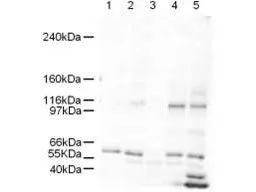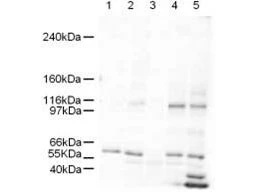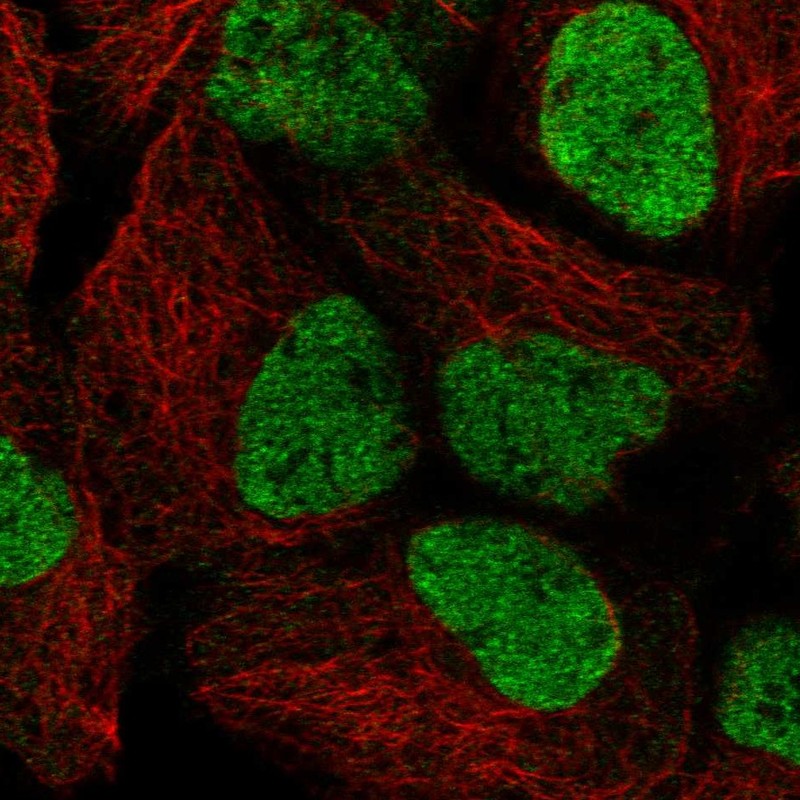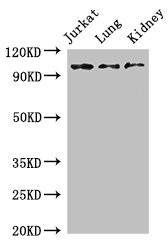
Western blot using GeneTexs Affinity Purified anti-SmarcAL1 antibody shows detection of a band ~106 kDa band corresponding to SmarcAL1 in human derived cultured cell lysates (Lane1: HeLa nuclear extract, Lane2: HeLa cells, Lane3: A431 celss, lane 4: Jurkat cells, Lane5: 293T cells). Approximately 5microg of each lysates was run on a SDS-PAGE and transferred onto nitrocellulose followed by reaction with a 1:500 dilution of anti-SmarcAL1 antibody. Signal was detected using standard techniques. SmarcAL1 is the band seen between the 97 and 116kD markers.
SmarcAL1 antibody
GTX24743
ApplicationsWestern Blot, ELISA
Product group Antibodies
ReactivityHuman
TargetSMARCAL1
Overview
- SupplierGeneTex
- Product NameSmarcAL1 antibody
- Delivery Days Customer9
- Application Supplier NoteWB: 1:500-1:3000. ELISA: 1:16000-1:64000. *Optimal dilutions/concentrations should be determined by the researcher.Not tested in other applications.
- ApplicationsWestern Blot, ELISA
- CertificationResearch Use Only
- ClonalityPolyclonal
- Concentration2 mg/ml
- ConjugateUnconjugated
- Gene ID50485
- Target nameSMARCAL1
- Target descriptionSNF2 related chromatin remodeling annealing helicase 1
- Target synonymsHARP, HHARP, SWI/SNF-related matrix-associated actin-dependent regulator of chromatin subfamily A-like protein 1, ATP-driven annealing helicase, HepA-related protein, SMARCA-like protein 1, SWI/SNF related, matrix associated, actin dependent regulator of chromatin, subfamily a like 1, sucrose nonfermenting protein 2-like 1
- HostRabbit
- IsotypeIgG
- Protein IDQ9NZC9
- Protein NameSWI/SNF-related matrix-associated actin-dependent regulator of chromatin subfamily A-like protein 1
- Scientific DescriptionThis protein is a member of the SWI/SNF family of proteins. Members of this family have helicase and ATPase activities and are thought to regulate transcription of certain genes by altering the chromatin structure around those genes. The encoded protein shows sequence similarity to the E. coli RNA polymerase-binding protein HepA. Mutations in this gene are a cause of Schimke immunoosseous dysplasia (SIOD), an autosomal recessive disorder with the diagnostic features of spondyloepiphyseal dysplasia, renal dysfunction, and T-cell immunodeficiency.
- ReactivityHuman
- Storage Instruction-20°C or -80°C,2°C to 8°C
- UNSPSC12352203





